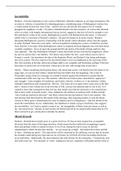Inevitability
Richard – from the beginning we get a sense of Richard’s inherent weakness as our tragic protagonist. His
aversion to violence is somewhat of a daunting prospect, considering many of Shakespeare’s heroes face
a violent ordeal in their last Acts of fate. ‘And for our eyes do hate the dire aspect of civil wounds
ploughed by neighbors' swords.’ Not able to defend himself in his last moments. As well as this, Richard
relies on words, with lengthy lamentations that are lyrical, suggestive that this will not be enough to save
him and that he is false in his words. Bullingbrook is used to foil Richard from the outset. A renowned
soldier who is a favourite of Richard’s subjects, ‘off goes his bonnet to an oyster wench,’ Richard
disregards Bullingbrook’s positive relationship with the people which ultimately allows him the support
to usurp. Richard ‘farms the royal realm,’ and sees England as nothing but a source of which he can take
from, that this is his right. When Bullingbrook returns to England, Richard flippantly but with little belief,
woefully complains, ‘let us sit upon the ground and tell sad stories of the death of kings and how they
were deposed.’ This line foreshadows Richard’s entire fate before he has even had his anagnorisis, shows
his naivety and his fate’s inevitability. The Queen also predicts his fate, ‘some unborn sorrow ripe in
Fortune’s womb,’ she introduces the idea of the Boethian Wheel, and Richard’s fate being unfortunate
due to his actions. She also expresses the fact that Richard is not yet enlightened to his receiving of this
fate. Her omission in the play otherwise perhaps adds to our sympathy and frustration, perhaps if she had
been there to advise him, he would have woken up to his fate with enough time to prevent it.
Gatsby – When considering the Hegelian theory, this being that society will benefit from the death of our
tragic hero, we can see that Gatsby’s death had been inevitable from the beginning. This is due to
Fitzgerald’s using of him as a message, he wanted to protest against the detriment to people that the
consumerism of the Jazz Age was. The summer, when the novel takes place, described as ‘oppressive’
and ‘struggle’ is the metaphor for hedonism, and Gatsby with his ‘swollen car’ is the hedonist. Gatsby
embodies materialism and consumerism. The line, ‘Life starts all over again when it gets crisp in the fall,’
and F. choses to have Gatsby die on the first day of Fall, conveys the intention that he was to die. As F.
wanted to show that consumerism does not last, that Gatsby and what he represents to be consumerism –
had to die in order to benefit society. Also, emphasizes the rashness of summer itself, Jordan remarks
‘who would get married in this heat?’ and Daisy retorts that she had married Tom in the summer. This
rash decision that then fixed her life inside of this marriage, then triggering Gatsby to seek the dream
version of Daisy goes to demonstrate the craze of summer and its consequences – that one should avoid,
much like materialistic excess. Additionally, the flashback to Gatsby trying to find Daisy also suggests
the inevitability, ‘as if only to snatch a wisp of air,’ the intangibility of Daisy from the outset as well as
the ‘sun turned away,’ already, he has become left behind and led by an unachievable dream that he will
then overreach to get, costing him eventually his demise.
Moral Growth
Richard – Richard does morally grow to a great extent too. He has an early anagnorisis, an arguable
diversion from the norm of the tragic structure, which means that he realizes his wrongdoings, regrets
them and perhaps wishes to repent for these. In Act Four, during the mirror scene, he has this
enlightenment, which elevates him morally - ‘as you mount up on high... this bucket down here and full
of tears... drinking my griefs.’ This idea that he will be sustained by his suffering, conveys that he mourns
his mistakes made during his reign and now he will learn, he will feed off of the knowledge that he has
never had before. Additionally, the most infamous line and obvious for his realization, ‘I wasted time now
time doth waste me.’ The antistatis of ‘waste’ emphasizes the now emptiness of Richard and the extent at




